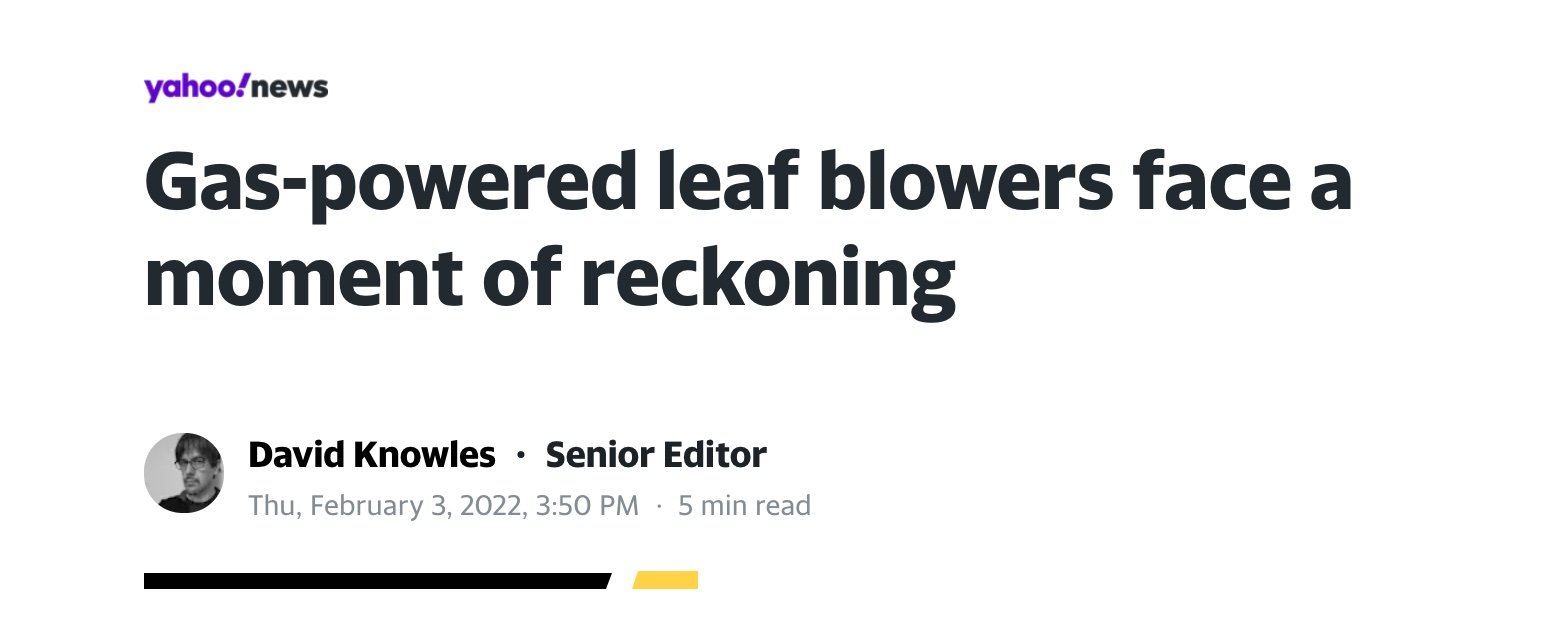Here are several updates on the national perspective of “accelerating the inevitable” in the shift from uniquely polluting gas-powered lawn equipment to battery alternatives, and on the local developments in Washington D.C.
1) Washington Post: ‘How to Deal With Your Leaves’
In Washington the journalist Rachel Kurzius has covered the leaf blower issue for years. She is now a writer for The Washington Post, and as the autumn leaf-handling season intensified, she wrote about the consequences of the District’s complete ban on gas blower equipment. The whole story is here.
It discusses the perils of two-stroke engines but then raises the larger sustainability issues. Sample:
“Leaf litter is an astonishingly rich habitat” for animals, especially insects, which lay their eggs there in winter, says Matthew Shepherd, director of outreach and education at Xerces Society for Invertebrate Conservation. It also improves soil health, which in turn helps sustain plants that attract pollinators.
Xerces Society has a “Leave the Leaves” campaign, encouraging people not to completely tidy up fallen foliage. Shepherd emphasizes that it’s not an all-or-nothing proposition: “You don’t have to keep your lawn smothered with them.” (He also stresses that the campaign does not apply to climates prone to wildfires, where collecting leaves is a matter of safety.)
“We’re facing all sorts of issues in our lives: climate change and loss of species and pollution,” Shepherd says. “Often, people are looking for simple things they can do, and what you do in your garden is a really straightforward, simple, direct action that people can take.”
2) National Catholic Reporter: ‘Beat Swords into Plowshares, and Leaf Blowers into Rakes’
From Mike Jordan Laskey in National Catholic Reporter, another powerful argument about individual responsibility — and the difference each householder and community can make. The full article is here. A sample:
Sometimes, the work for environmental justice can feel overwhelming because there is so much to do, so many powerful players blocking progress and so many problems to address. But this [banning gas-powered blowers] is a slam dunk on a 4-foot kiddie basketball hoop…
The movement to get rid of gas-powered leaf blowers has accordingly taken off all over the place. More than 100 U.S. towns and cities have banned them outright. Popular opinion is shifting: As one journalist put it, gas-powered leaf blowers "are viewed about as favorably these days as smoking indoors."
He also recommends a very broad view:
If the data and success stories aren’t enough to inspire action, Pope Francis' encyclical Laudato Si' lends some moral authority to the "ban the blowers" movement. He talks about the specific problem of noise pollution in two different paragraphs. And his emphasis on what he calls "integral ecology" is a reminder that what hurts the environment also usually hurts those who are most poor…
Francis in Laudato Si' also calls us to think beyond our own personal choices, as important as those are, and to get involved with community-level environmental justice efforts. "Along with the importance of little everyday gestures, social love moves us to devise larger strategies to halt environmental degradation and to encourage a 'culture of care' which permeates all of society," Francis writes.
"When we feel that God is calling us to intervene with others in these social dynamics, we should realize that this too is part of our spirituality, which is an exercise of charity and, as such, matures and sanctifies us."
3) And more leads
The movement is spreading. Two Substack posts by James Fallows give summaries of local developments. You can read them here and here. The second post ends with an echo of the other articles mentioned here:
“Here’s the thing about tipping points,” Peter Leyden wrote in an article I cited recently. He continued:
When they happen, they happen fast… Some new trend will slowly grow in popularity on the fringes of society and once it gets enough exposure then — boom — everyone does it.












